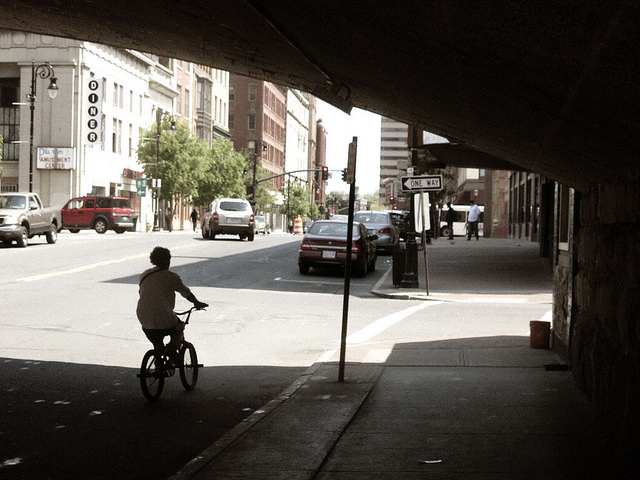Question 1: Another slots parlor in Massachusetts?
More stories from Wei Cai
A bicyclist on Main Street in Springfield, Mass.(blekky/Flickr)
AMHERST — Massachusetts voters have their intentions set on electing the next president to come Nov. 8. But before they submit their ballots, they must also answer four questions.
Of those, the very first could allow a second slots parlor to open in the state.
A “yes” vote on Question 1 would require the state’s Gaming Commission to issue another Category 2 license for a new slots parlor. This slots parlor would be competing directly with Plainridge Park Casino in Plainville, the only one of its kind permitted by law in the state.
Presently, there are no Category 2 licenses available — that’s why the referendum is on the ballot. These licenses allow for slots machine-only casinos to operate.
The referendum comes to light as Eugene McCain Jr., a developer, pushes to have his wish for another slots parlor comes to fruition. In an interview with the Boston Globe, McCain states this is something residents want.
If the referendum passes, according to the ballot, the license would come bundled with operational and geographical regulations.
Operationally, the slots parlor could have a maximum of 1,250 slots machines and no casino table games. Whereas geographically, it must be four acres in size, adjacent to and within 1,500 feet of a race track that is not separated by highways or railroads.
Question 1 further specifies the race track must be able to hold — and has previously held — a horse racing meeting.
But the odds of this referendum passing are not in McCain’s favor. In an October poll conducted by WBUR, 58 percent of voters opposed the referendum; signifying a “no” vote.
Many first-time voters such as Michelle Van, a freshman at the University of Massachusetts Amherst, have mixed opinions on the referendum.
“I’m indifferent. I think that if people were to gamble, it wouldn’t matter … [slots machine] casinos can bring in revenue,” Van said.
The indifference that Van expresses could be explained by the novelty of the casinos in Massachusetts. According to Lily Chapman, a freshman at UMass Amherst, casinos simply have not been a part of her community.
“I’ve never really been exposed to a community where casinos are an integral part of the infrastructure of the economy so I am going to have to look into it,” said Chapman.
If the drama with casinos seems like déjà vu, it’s because Massachusetts has an extensive history of commercial gaming.
Back in 2011, the Expanded Gaming Act was signed into law by former Governor Deval Patrick, which allowed three casinos to be built in the state along with one slots parlor.
After an attempt to repeal this act in 2014, voters made it clear that commercial gaming was here to stay. This is the same act that makes the construction of MGM Springfield possible. MGM Springfield will be a Category 1 licensed casino, set to open in September 2018.
As a resident of Springfield, Karly Dunn, a junior journalism major at UMass, recalled a first-hand account of how MGM Springfield will affect her community.
“Even though the casino will be located downtown now, I know our city will be impacted greatly. I understand that tourism will increase as well as our economy, but the social impact would be a lot less positive … Springfield is riddled with crime and poverty and we’re trying to find a way out of that as time goes on,” Dunn said.
It is possible that many who oppose the referendum share Dunn’s concern over increased crime. However, she does acknowledge the point that many supporters of the referendum argue: a casino would bring economic benefits, especially jobs, to the community it is built in.
A “no” vote on Question 1 would mean no change to the current laws in Massachusetts, and therefore no new licenses for casinos will be issued. However, as with all things related to this election, there is no guarantee.
Email Wei at wcai@umass.edu, or follow him on Twitter @weicaiumass.

